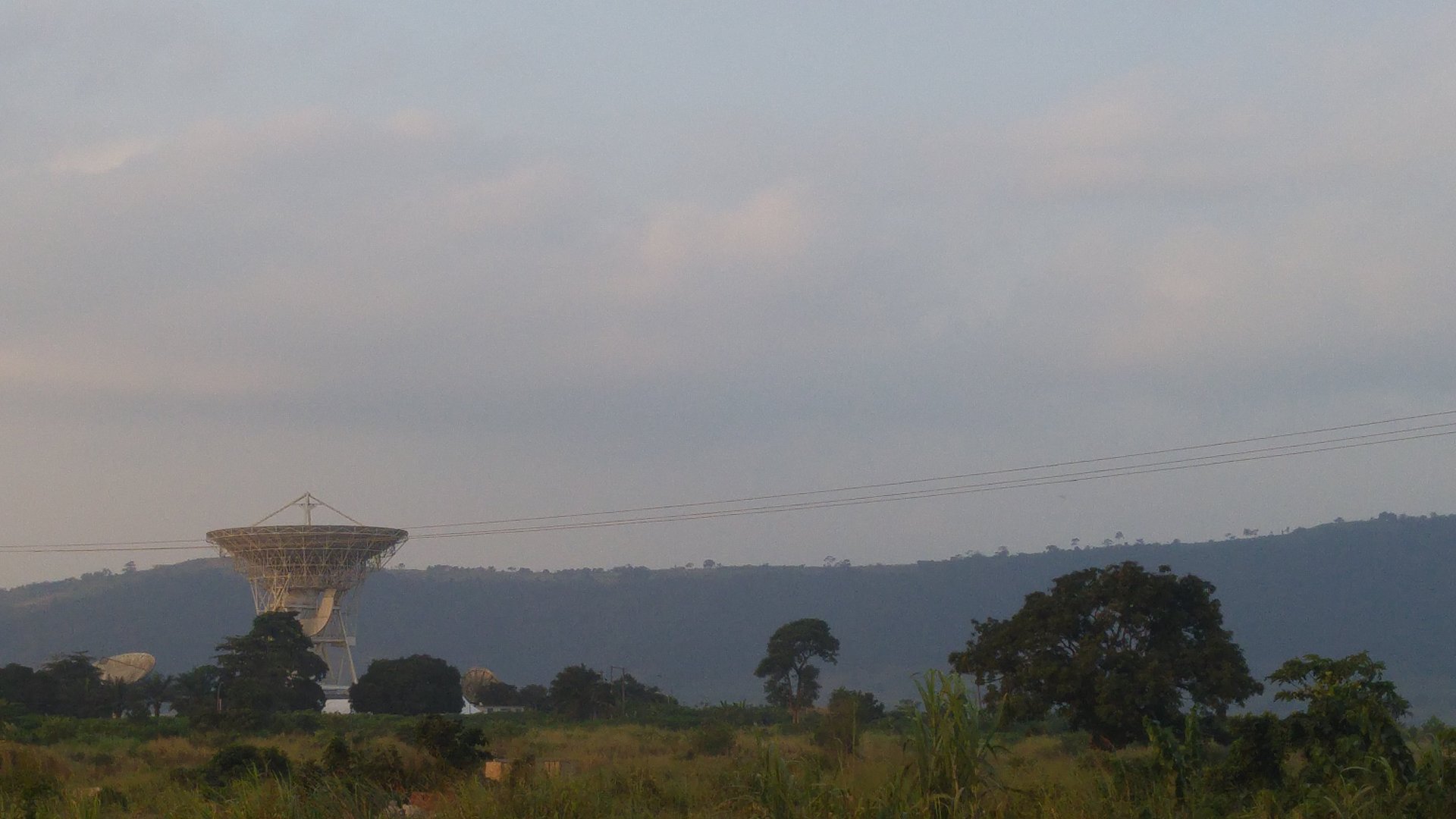Ghana’s first radio telescope is the start of a continent-wide project to capture the complete African sky
Ghana launched its first radio astronomy observatory on Thursday in an effort to widen knowledge of African skies, catalyze skills development, and attract scientists. A 32-meter wide (104-foot) radio telescope, converted from an old telecommunications dish, forms the heart of the observatory, which is in Kuntunse, about an hour from the capital Accra.


Ghana launched its first radio astronomy observatory on Thursday in an effort to widen knowledge of African skies, catalyze skills development, and attract scientists. A 32-meter wide (104-foot) radio telescope, converted from an old telecommunications dish, forms the heart of the observatory, which is in Kuntunse, about an hour from the capital Accra.
Previously a mainstay of communication on and from the continent, large telecommunications dishes have been made redundant since the introduction of undersea cables down Africa’s coasts. Astronomers are eyeing these dishes with plans to turn them into radio telescopes. Ghana’s dish, donated to the government by Vodafone, is the first of a number of planned conversions.
Ultimately, these dishes will form a web of telescopes, known as the African VLBI Network. With its widely spaced dishes, the network will be able to observe the skies that straddle the southern and northern hemispheres, and provide a training ground for scientists and engineers on the continent.
Until the conversion of the Kuntunse telecoms dish, South Africa was the only African country with radio telescopes that linked to other countries. These telescopes connected to European networks, but there was a gaping hole in coverage over the rest of Africa. With the inclusion of the Ghanaian telescope, global radio astronomy networks will be able to see the universe in greater detail than before.
“We’re able to detect activities that are happening in some patches of the sky, and link up with other facilities across the world,” said Dr Bernard Duah Asabere, manager of the new observatory. “Because of our position, we see the northern and southern hemispheres and can tell the world things [the scientific community does] does not know.” Asabere, the country’s first local astronomer, returned to Ghana from South Africa, where he studied, to manage the observatory.
“Big science infrastructure projects attract scientific talent,” South Africa’s science and technology minister Naledi Pandor said ahead of the launch. “Initiatives such as this bring our talent back home. They promote brain gain.”

South Africa has been the driving force behind the refurbishment of the Kuntunse telescope, and plans for the African VLBI Network. It bankrolled the conversion, which cost about R122-million ($9.2 million), through its African Renaissance and International Cooperation Fund. This move is, in part, fostered by South Africa’s own radio astronomy ambitions.
South Africa and Australia will host the Square Kilometre Array (SKA) which, when completed in 2030, will be the largest radio telescope in the world. The telescope will be so sensitive that it will be able to hear faint signals from far corners of the cosmos, and answer some of humanity’s most enigmatic questions: Are we alone in the universe? What is dark matter? How are galaxies born?
SKA will also include satellite stations in eight African partner countries: Botswana, Ghana, Kenya, Madagascar, Mauritius, Mozambique, Namibia, and Zambia. Currently, these countries have limited astronomy capabilities. But that is what the African VLBI Network aims to change. Although the refurbished Ghanaian telescope will not form part of the SKA, it has been heralded as a way to develop skills in Ghana and to enable the country to contribute to global science.
Talks are currently underway to convert old telecommunications dishes in Madagascar and Zambia.
While South Africa has been instrumental in converting the dish, Ghana owns the telescope and is responsible for its operations and maintenance, says Anita Loots, associate director of special projects for SKA South Africa. Ghana will also direct the science undertaken on the telescope. The Ghanaian telescope aims to cut its teeth on methanol masers, which are radio emissions that can arise from a number of celestial phenomena, and pulsar research. Pulsars are stars that emit beams of radiation.
The director of the Ghana Space Science and Technology Institute, Dickson Adomako, said that they were pushing to include astronomy in their university curricula to attract students to the discipline. Projects like Kuntunse will hopefully encourage them to stay home, Loots said.
“We have brilliant mathematicians, nuclear physicists, engineers. They are theoretically strong, but don’t have laboratories to fiddle in,” she said. “They have an excellent theoretical background, but have never seen a soldering iron, for example.”
“Projects like the SKA and African VLBI Network will be able to train young students to write a different story about Africa going forward,” she said.